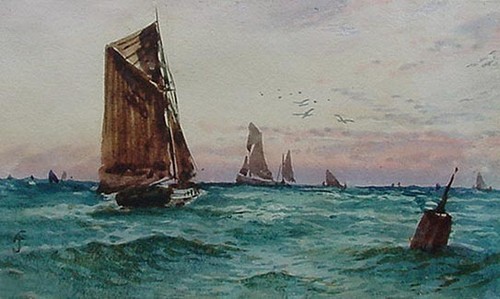When is an Ocean not an Ocean? - When it has no Fish.
by Blackwattle Studios on 22 Dec 2008

Fishing - a way of life for thousands of years. Now it’s under threat SW
Most cruising sailors love to troll for fish, or throw in a line when anchored.
It's good fun, although sailing would still be sailing without the fish. However, many of the world's coastal populations depend on heavily fish as their main diet, and a lack of fish would spell disaster for the world.
So when scientific studies show the fish are fast disappearing, it's understandably alarming.
The major culprit is overfishing -- a non-sustainable practice in which the removal of fish outpaces their ability to reproduce. This can, and does occur in any body of water from a pond to our vast oceans. According to www.overfishing.org, an independent source of information about the ocean threats, notes, 'a total of almost 80% of the world's fisheries are fully- to over-exploited, depleted, or in a state of collapse.'
The severe depletion or removal of a species from an ecosystem can also have drastic effects on many other species, as well as on the ecosystem as a whole. Although many scientists consider this a major problem facing our oceans today, it is often reversible simply by giving an imperiled stock enough downtime to heal and replenish.
Commercial fishing, which was once largely an industry of small, close-knit fishing communities, is now an orchestrated force of high-tech fishing fleets replete with state-of-the-art technologies such as fish-finding sonar, onboard processing and packing plants, and enormous freezing systems.
With such massive machinery afloat, it is a surprise that any fish could find a way to thrive. As species becomes depleted and is no longer viable, fishermen must root out replacements. Once considered “trash fish,” species such as monkfish, sharks, and squid now prove quite valuable. So valuable, in fact, they now also run the risk of falling victim to overfishing. Enough overfishing inevitably leads to job loss, which will hurt both the commercial fishing fleet and the greater marine-dependent economy that draws direct and indirect benefits from this industry.
Along with overfishing, mortality caused by the discarding of ‘bycatch’ (unwanted species caught while fishing for the target species) also has the potential to negatively affect marine ecosystems. Perhaps the best-known case of bycatch was the trapping of dolphins in tuna nets that drew public attention in the late 80’s and early 90’s. For a variety of reasons—limited space on vessels, permits, size, lack of market value—bycatch is typically tossed back overboard, sometimes dead or dying. According to the United Nations Food and Agriculture Organization, one in four untargeted animals caught in fishing gear dies.
In addition to dolphins, other species such as sea turtles, seals, whales, sea birds (including the endangered albatross), skates, sharks, and fish accidentally become bycatch in the world’s commercial fisheries. The implementation of gear modifications (e.g. turtle-excluder devices and long-line “streamers”) has helped to reduce the rate of bycatch in some fisheries. However, in many commercial fisheries bycatch remains a major issue.
Commercial fishing can also inflict negative impacts on marine habitats. Bottom trawls, which are massive nets dragged along the seafloor, indiscriminately scoop-up whatever is in their path and can severely damage corals and seagrasses, as well as alter structural formations on the seafloor. Fish and shellfish need these places to hide, feed, and most importantly, to breed. Fitted with “rockhoppers” (often old tires) and “iron doors,” this type of fishing gear crushes vital habitat, leaving behind a desolate, feature-less seafloor. Unfortunately, according to Monterey Bay Aquarium, once damaged, these living seafloors (including sea sponges and coral) may take centuries to recover fully.
This high impact activity also comes with an enormous opportunity cost as researchers are only now discovering tremendous medical potential amidst the biodiversity of the deep ocean floor. Putting this impact into perspective, according to the Natural Resources Defense Council the area of the ocean floor leveled by bottom trawling is 150 times larger than the forest areas clear-cut each year worldwide.
The actions of individuals can make a difference and effect change, and it all starts with knowledge and education. Know which species are in danger and adjust your purchases accordingly, as this can affect stores’ purchasing habits that in turn affect fishing practices in the ocean. The next time you are in the fish market or a restaurant, ask where the fish comes from and how it was caught.
This encourages the purveyor to learn more about their product, and draws attention to increased consumer demand for sustainably harvested fish. It is simple economics -- supply and demand. If you’re mindful of the ecological impacts of your preferences then many more species stand a chance of survival.
If you want to link to this article then please use this URL: www.sail-world.com/52099